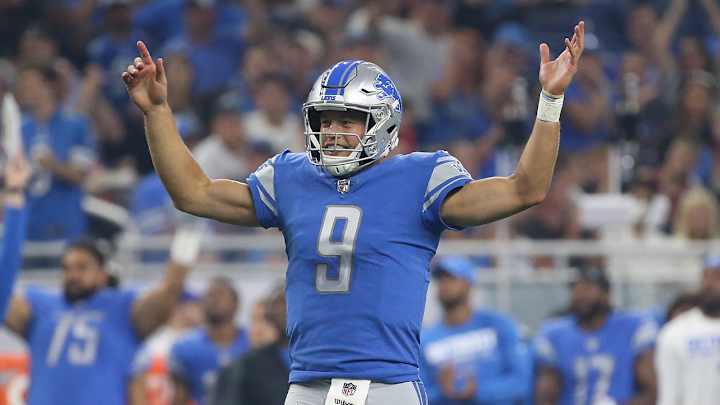Lesson of the Week: Matthew Stafford Contract Extension Was Inevitable


Repeat after me: Paying. Matthew. Stafford. Was. A. No. Brainer.
Let’s not make this harder than it actually is.
Stafford had completed 67.2 percent of his passes for 3,224 yards, 21 touchdowns, five interceptions and a 100.5 passer rating through 12 games last year, then tore ligaments in and dislocated the middle finger on his throwing hand, and played through that. He’s 29, and plays a position where three 30-somethings have won NFL MVP over the past four years. It’s easy to make the case that he’s still ascending.
Based on that, I’m not sure what anyone expected Detroit to do other than lock him up. Wait for the next Tom Brady or Aaron Rodgers to fall out of the sky? Bottom out for a high draft pick, and hope you have it in the right year? Do that, and the likelihood is someone else will be doing the picking before you get it right.
Conversely, if you’re stable at the position, as Detroit has been the past nine years, it colors every other decision you make, and facilitates building, which isn’t lost on the man who was on the other side of the negotiating table.
“Stability at the position is hard to find, no question,” GM Bob Quinn told me Wednesday night. “And the position is becoming increasingly difficult to scout in college football with the high percentage of teams using a version of a spread offense. You really draft quarterback traits and hope they transfer to the NFL game.”
Because he inherited Stafford, Quinn doesn’t have to follow his own advice. And he doesn’t really want to be in that position either.
As for the price, eventually, people will be at peace with the fact that quarterbacks are paid differently from everyone else. And the highest paid of them will usually be the most recent good ones to get contracts or extensions. In fact, it’ll probably be Kirk Cousins in a few months.
The MMQB Mailbag: NFL Quarterback Contracts Are Monopoly Money
And if you really want to break it down, it’s easy to argue that Stafford actually took a discount. A 2017 tag ($26.4 million) and 2018 tag ($31.68 million) would add to $58.08 million. A third tag for him, in 2019, would cost Detroit $45.62 million. So the fact that he took $27 million per year when he very well could’ve played the tag game—like Cousins and the Redskins—and made a lot more should show why the deal he did do is actually very reasonable.
Now, Stafford and the Lions can move forward and build together.
“I’m really happy we were able to get this done prior to the start of the season,” Quinn said. “We never put a deadline on it, but this allows us to concentrate on the season with no distractions. These types of deals are not easy to do, but it came together pretty quickly in the end, and it took a lot of work on both sides. Happy to have our quarterback here through 2022.”
Quinn, of course, saw the benefit of quarterback stability during all those years he spent in New England. He knows you can’t put a price on it.
And maybe Stafford’s not Tom Brady, which makes him a lot like pretty much every other good quarterback in the NFL—needing the right mix of coaches and players and system to succeed. The good news is, with this piece of business out of the way, it’ll be easier for the Lions to get going in earnest at building that for him.
• Question or comment? Email us at talkback@themmqb.com.
